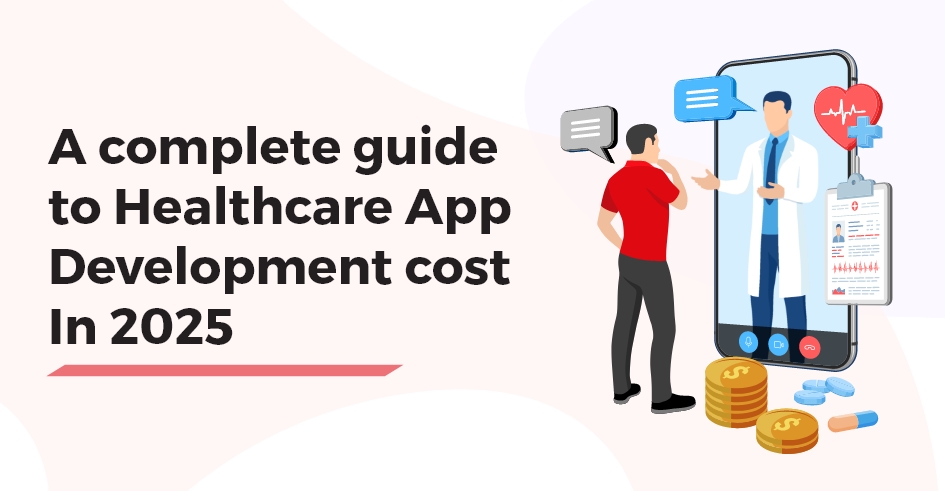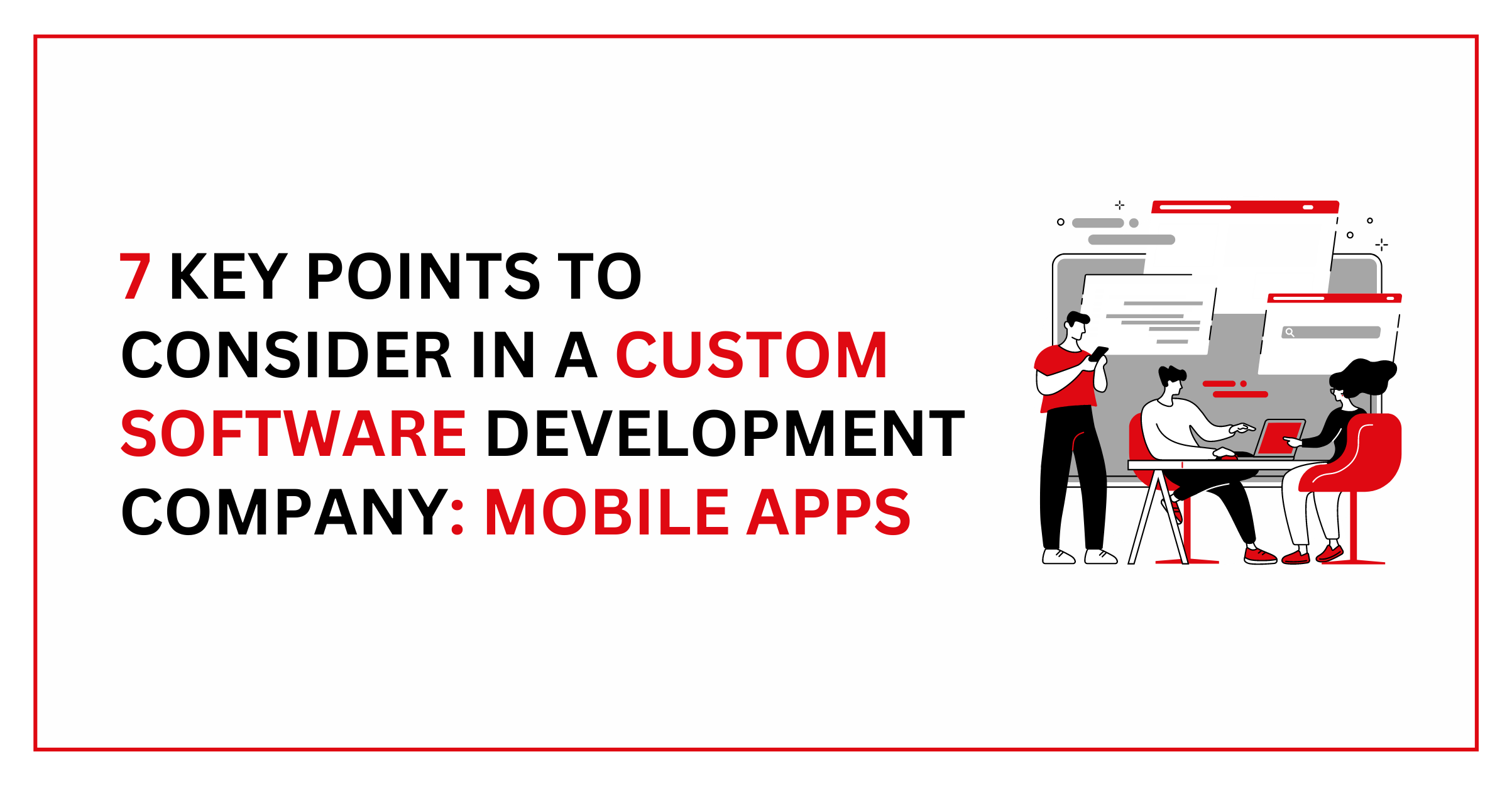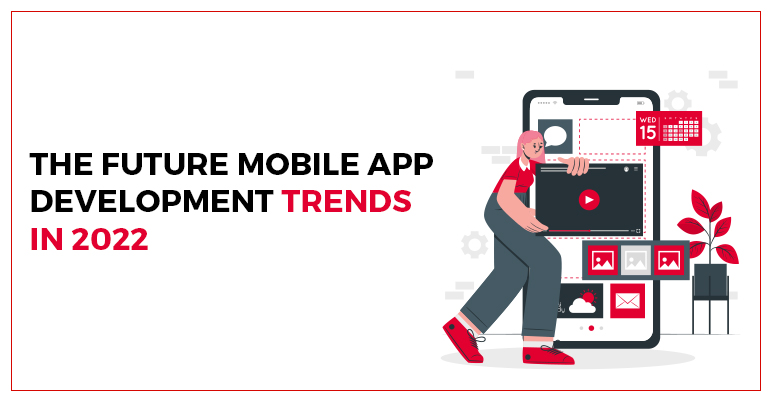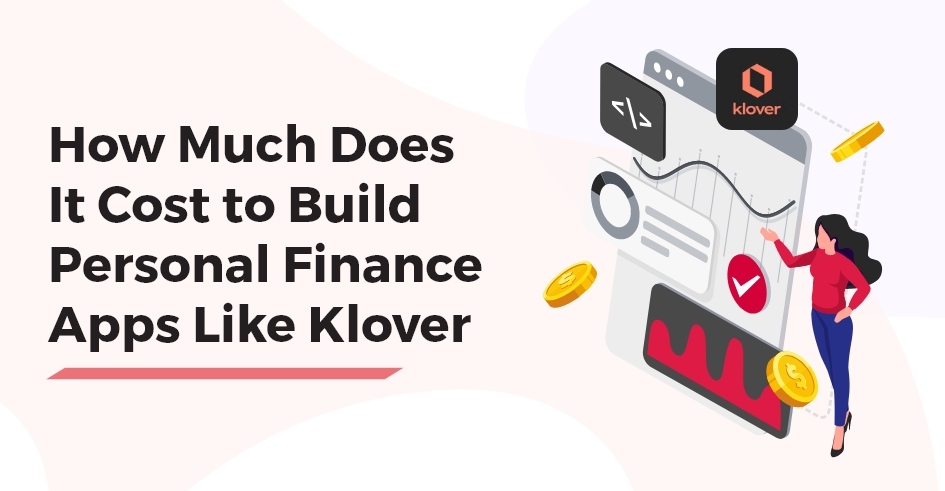As 2025 is only a month away, more healthcare providers and startups want to develop a healthcare app for tech-savvy patients. The main question here is “healthcare app development cost.” With the rising costs of developing healthcare apps make this difficult. Advanced features like telemedicine, patient portals, and AI integration increase expenses. Balancing innovation with limited budgets is a challenge, especially with new regulations and security standards.
Creating a medical app in 2025 requires more than just technology skills; you also need a good understanding of what’s next in healthcare. This blog will explore what affects the cost of developing a healthcare app. We’ll discuss key features like telemedicine, patient portals, and AI, as well as the latest trends in medical mobile apps.
We’ll provide strategies to help you design a cost-effective healthcare app that meets high security and usability standards. Whether you are making a specialized medical app or a general healthcare solution, this guide will help you make smart, cost-conscious decisions for your project.
After thorough analysis, healthcare app development costs between $100,000 and $500,000. The cost of healthcare app development varies depending on the type of app, the complexity, and, most importantly, the features you are going to need to make one of the best healthcare apps in 2025.

The State of Healthcare in 2025
In 2025, healthcare app development costs will be influenced by an evolving healthcare ecosystem. Mobile health applications now play an important role in patient and provider interactions, offering innovative ways to manage health.
Telemedicine apps, for example, have become mainstream, enabling patients to consult doctors remotely. To further claim this, The telemedicine market worldwide was valued at USD 97.15 billion in 2023 and is expected to be worth USD 107.52 billion in 2024. It is anticipated to grow to USD 432.31 billion by 2032, achieving a compound annual growth rate (CAGR) of 19.0% throughout the forecast period. Telemedicine apps are invaluable for people in underserved or remote areas. However, integrating secure video conferencing and maintaining reliable connections can significantly increase the cost of mobile health application development.
Personalization and AI-Powered Features
The healthcare app development market is dominated by mobile apps that offer personalization as a top priority. As more people search for a Mobile app development company Dallas to integrate these features in the Dallas area, the healthcare app development cost is expected to rise.
AI and machine learning enable apps to tailor treatment plans based on individual health data. These intelligent solutions not only improve patient care but also contribute to preventative measures that can reduce long-term healthcare expenses. Yet, developing apps with sophisticated algorithms adds to the healthcare app development cost due to the need for advanced AI infrastructure and data processing capabilities.
The Rise of Wearables and IoT
Wearables like smartwatches and health trackers are projected to become more popular in 2025. We all have that smartwatch that we dearly love, don’t we? The reason is that they allow users to track vital health metrics in real time. Healthcare apps that support IoT integration can be invaluable for managing chronic conditions, providing a deeper connection between patients and providers. Again, integrating these features drives up development costs due to the need for secure data syncing and reliable connectivity.
Core Features Driving Healthcare App Development Cost in 2025
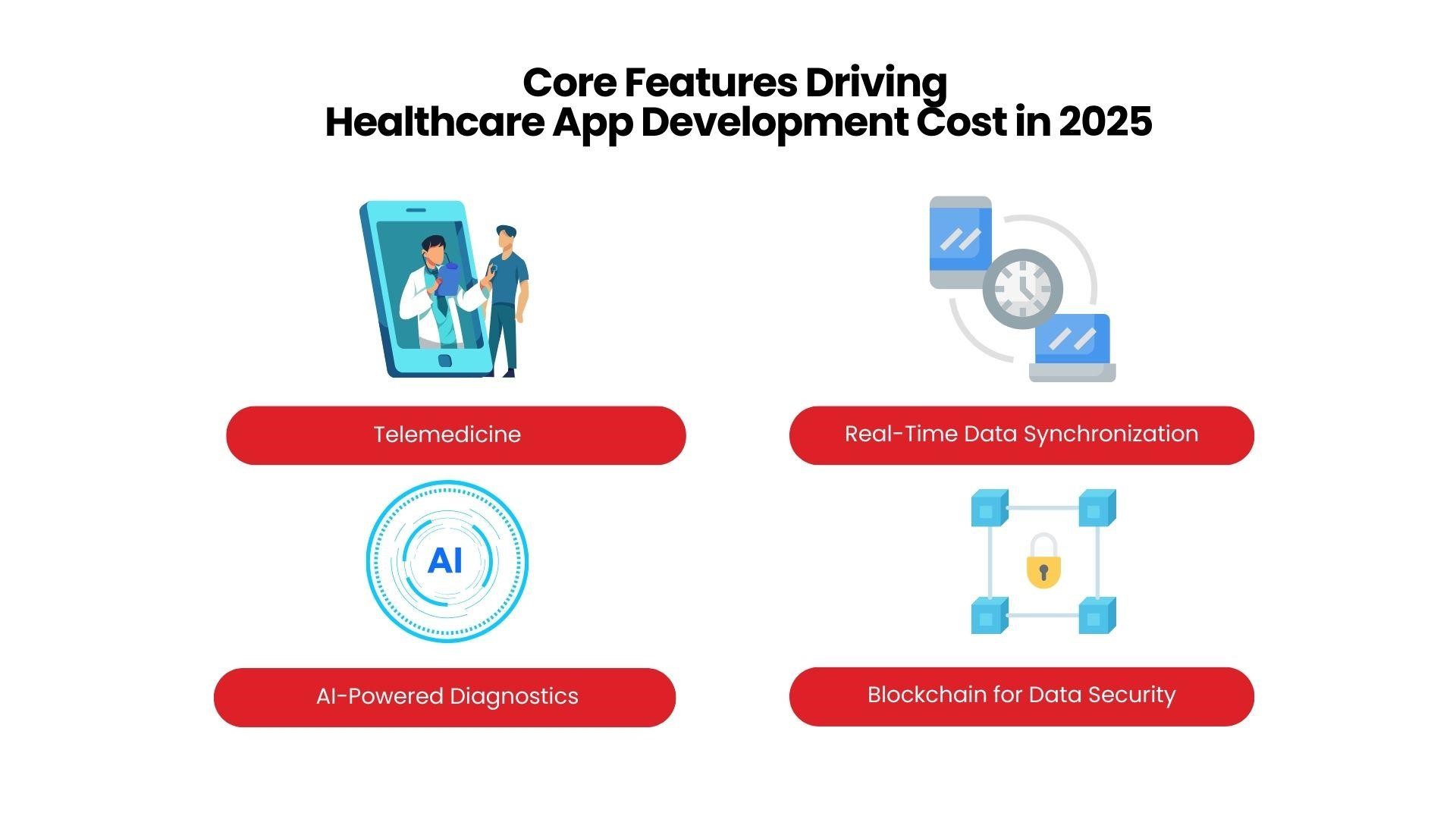
Building a healthcare app in 2025 requires more than basic functionality. Key features, many of which are now expected, add complexity and cost to medical mobile app development. Here are some of the major features influencing the healthcare app development cost:
Telemedicine
As we’ve discussed above, Telemedicine allows patients to connect with healthcare providers virtually, significantly expanding access to care. Developing secure video streaming, integrating chat functions, and ensuring compliance with healthcare regulations add to the medical mobile app development cost.
Real-Time Data Synchronization
The integration of wearables with mobile health apps is a benefit on its own. However, This feature requires complex back-end infrastructure to securely sync and store real-time data, increasing development expenses.
AI-Powered Diagnostics
Healthcare apps are beginning to influence AI for diagnostics. As AIRPM quoted, “From 2020 to 2023, the healthcare AI market expanded by 233%, increasing from $6.7 billion to $22.4 billion.” This shows the power of Artificial Intelligence Services in enabling earlier disease detection and individualized treatment plans. Building AI-driven capabilities requires a high healthcare app development cost, but these features can greatly enhance the app’s value.
Blockchain for Data Security
As data security remains a top concern in healthcare, blockchain technology is gaining traction for medical mobile application development. Blockchain ensures secure and transparent management of sensitive patient records but also requires specialized development expertise, impacting costs.
Estimated Costs for Healthcare App Development in 2025
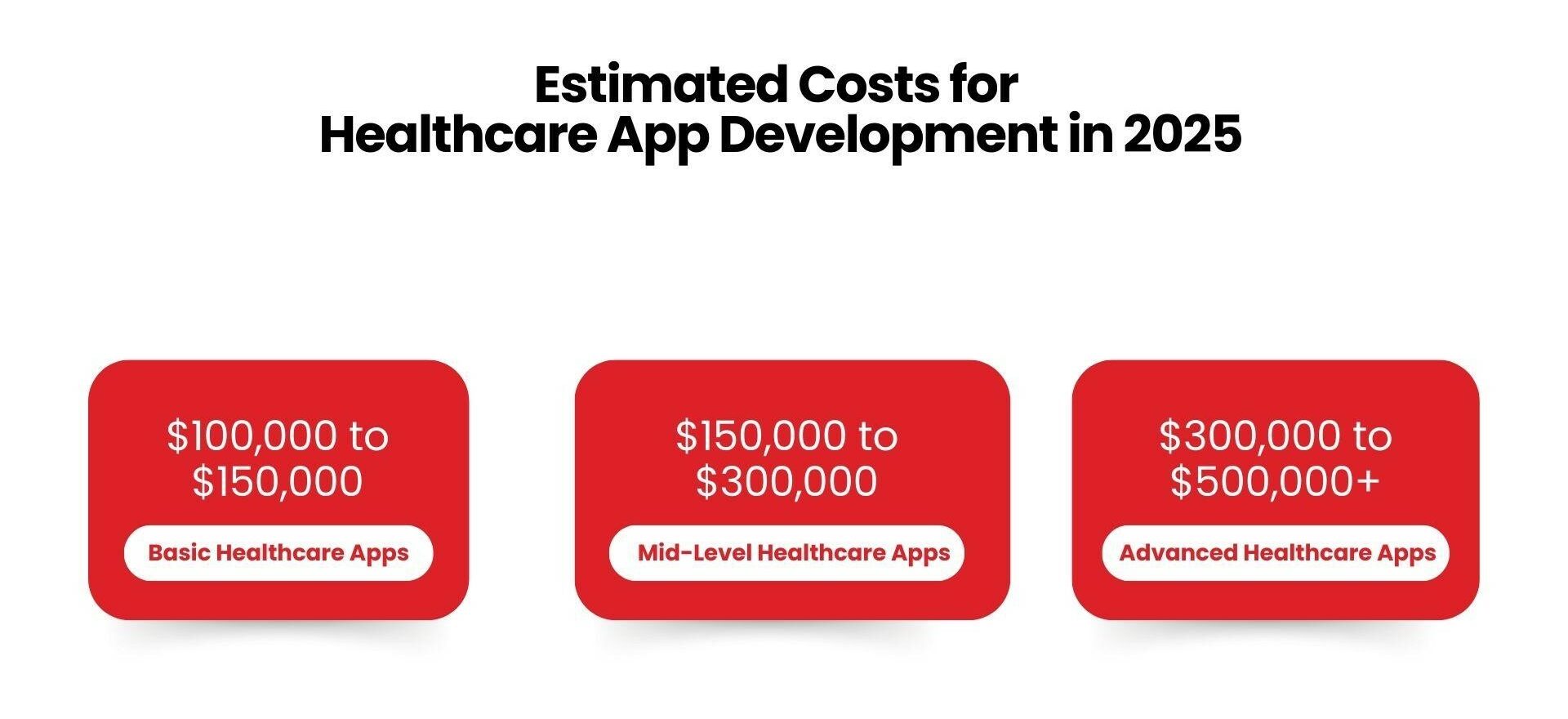
The healthcare app development cost in 2025 will vary depending on the app’s complexity, features, and security requirements. Here’s an approximate cost breakdown based on different types of healthcare apps:
Basic Healthcare Apps
Basic health-tracking apps with essential functions like medication reminders or appointment scheduling typically cost between $100,000 and $150,000. Their simpler functionality and lack of advanced integrations keep development costs at the lower end of the spectrum.
Mid-Level Healthcare Apps
Apps that provide telemedicine, wearable device integration, and basic data security features usually range from $150,000 to $300,000. This category might include hospital mobile app development for tasks like patient records management, appointment booking, and virtual consultations.
Advanced Healthcare Apps
Complex healthcare apps featuring AI-driven diagnostics, blockchain for secure data management, and IoT device compatibility can exceed $300,000 to $500,000. These projects require specialized teams and extensive development, which increases the cost of healthcare app development significantly.
How is Healthcare App Development Cost Calculated?
Estimating the healthcare app development cost involves considering several key factors: the app’s complexity, platform choice, location of the development team, and the technology stack used. Here’s a breakdown of how each element impacts costs:
1. App Complexity and Features
The complexity of a healthcare app largely determines its development cost. Basic apps, like health trackers or wellness platforms, which focus on monitoring simple health metrics, are more affordable. These types of mobile health application development projects generally cost between $100,000 and $200,000.
However, for more feature-rich apps, such as telemedicine platforms, AI diagnostic tools, or those with electronic health record (EHR) or electronic medical record (EMR) integration, costs can range significantly due to the need for advanced coding, secure data handling, and robust API integrations. For these types of apps, the healthcare app development cost can vary widely, typically falling between $200,000 and $500,000 depending on the level of functionality and security required.
2. Platform Choice
Native apps, created specifically for iOS or Android, deliver optimized performance and an enhanced user experience but come at a higher price. Due to the need to maintain separate codebases, healthcare app development costs for native apps are generally higher, particularly if you need both Android and iOS versions.
Cross-platform frameworks like Flutter and React Native enable you to develop a single codebase that works across multiple platforms. This reduces costs compared to native apps, making cross-platform a popular choice for mobile app development for healthcare that requires broad reach without doubling development efforts.
3. Geographic Location of Development Teams
Location is an important consideration when managing healthcare app development costs. TechnBrains’ staff augmentation services allow you to hire developers at just $99 per day, making it an efficient way to keep costs down.
US-Based Developers: They tend to have higher hourly rates but offer expertise in local regulations like HIPAA, which is crucial for compliant medical app development.
Offshore Development Teams: Skilled developers in Eastern Europe or Asia are often available at lower costs, significantly reducing healthcare app development expenses. However, challenges such as time zone differences and language barriers need careful management.
4. Technology Stack Used
Each technology integrated into your app influences the healthcare app development cost:
AI adds valuable functionality, such as diagnostics and predictive analytics, to medical mobile application development. However, AI integration requires specialized expertise, which can add to the total cost.
Cloud Computing
Platforms like AWS or Google Cloud support scalability and data security for high-volume apps. Although cloud infrastructure increases development costs, it’s essential for ensuring stability and data handling, especially in mobile healthcare application development.
Blockchain
Blockchain technology is increasingly used for secure patient data management. While implementing blockchain raises the healthcare app development cost, it offers data transparency and tamper-proof security, which are crucial for apps handling sensitive medical information.
5. Security and Compliance Costs
Ensuring compliance and security is a non-negotiable aspect of healthcare mobile app development, particularly in the U.S., where healthcare data must comply with stringent regulations:
- HIPAA-Compliant Apps: For apps that manage patient information, HIPAA compliance is essential. Building a HIPAA-compliant mobile healthcare application involves features like encryption and audit trails, which add to the development cost but are crucial for regulatory adherence.
- Encryption and Data Privacy: Apps handling sensitive data must include strong encryption and secure data storage solutions. While these measures increase healthcare app development costs, they are necessary to protect user privacy and maintain trust.
6. UI/UX design
A well-designed healthcare app is important for getting users to adopt and enjoy it. Users tend to engage more with apps that are easy to use and visually attractive. Hiring professionals for UX/UI design can enhance user satisfaction and may lower support for healthcare app development development costs in the long run. The cost of good UX/UI design often starts at $10,000 and can increase depending on how complex the design is.
1. Regulatory Compliance
Following healthcare rules like HIPAA (in the U.S.) and GDPR (in the EU) is paramount, especially for apps that handle sensitive health information. Ensuring compliance includes using encryption, secure access, and audit trails, which can raise healthcare app development costs. Not following these regulations can lead to fines and damage to your reputation, so investing in compliance is wise. Adding compliance features can increase total development costs by about 10-20%.
2. Data Privacy and Security
Strong security measures are necessary to protect patient data. Healthcare app development Costs include encryption, secure data storage, and regular security checks to prevent data breaches and keep user trust. Security features like encryption, firewalls, and audits can add between $10,000 and $20,000 to development costs, depending on the required security level.
3. Testing and Quality Assurance
Quality assurance includes unit testing, integration testing, and user acceptance testing, which ensures the app works smoothly on different devices and platforms. Testing costs usually account for about 15-20% of the total cost to develop a healthcare app, ranging from $15,000 to $50,000 based on app complexity.
4. Maintenance and Updates
After launching the app, ongoing maintenance and updates are needed to fix bugs, add features, and ensure compatibility with updated operating systems and devices. Long-term maintenance costs are typically estimated at 15-20% of the initial development cost per year, covering updates, bug fixes, and security patches.
5. Marketing and Promotion
Creating the app is just the beginning. It is equally important to attract users through good marketing. You can get help from app monetization strategies. Marketing costs can include app store optimization (ASO), social media campaigns, and paid advertising. Initial promotion might cost between $5,000 and $20,000, depending on how far-reaching and intensive the marketing efforts are.
Healthcare App Development Cost by Type
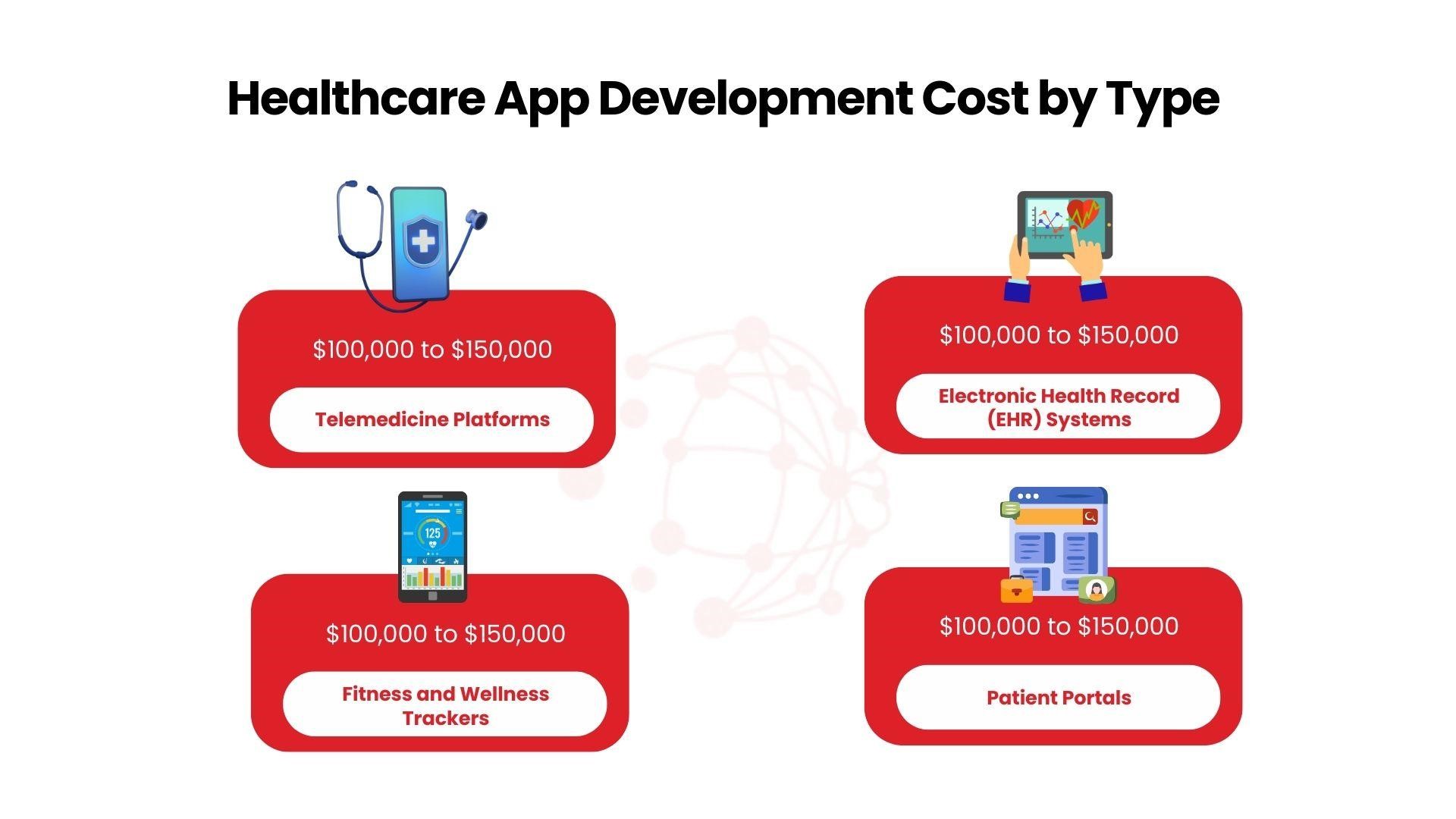
The cost of healthcare app development varies widely depending on the type of app, required features, security protocols, and compliance standards. Here’s a breakdown of typical costs for the most popular types of mobile medical application development:
Telemedicine Platforms
Telemedicine apps, which allow virtual consultations and remote patient monitoring, are among the most in-demand healthcare apps. Developing a basic telemedicine platform with essential features like video conferencing, scheduling, and electronic prescriptions generally costs between $80,000 and $250,000. For more advanced telemedicine apps with AI diagnostic tools, EHR integration, and multi-device compatibility, costs can rise to $300,000 or more.
Electronic Health Record (EHR) Systems
EHR systems are complex applications designed to securely store and manage patient medical records. Due to the sensitive data involved, they require HIPAA-compliant encryption, multi-level security, and robust cloud integration. The development cost for an EHR system generally starts around $100,000 and can reach up to $500,000 for comprehensive systems with real-time data synchronization, patient portals, and integration with other healthcare tools.
Fitness and Wellness Trackers
Fitness and wellness apps have become popular for monitoring physical activity, diet, sleep patterns, and other health metrics. Basic apps with limited tracking features, such as step counters and workout logs, cost between $20,000 and $60,000. However, advanced trackers that include integrations with wearables, AI-driven insights, and personalized health suggestions can increase costs to $100,000 or more.
Patient Portals
Patient portals provide a convenient way for patients to access their medical information, manage appointments, and communicate with healthcare providers. Simple patient portals that offer basic functionalities like viewing test results and scheduling visits can cost around $50,000 to $150,000. For more advanced portals with features like telemedicine, secure messaging, and payment options, costs can go up to $200,000 or higher.
The healthcare app development cost varies not only by the type of app but also by the complexity, platform, and compliance needs specific to each solution.
Cost Reduction Strategies for Healthcare App Development in 2025
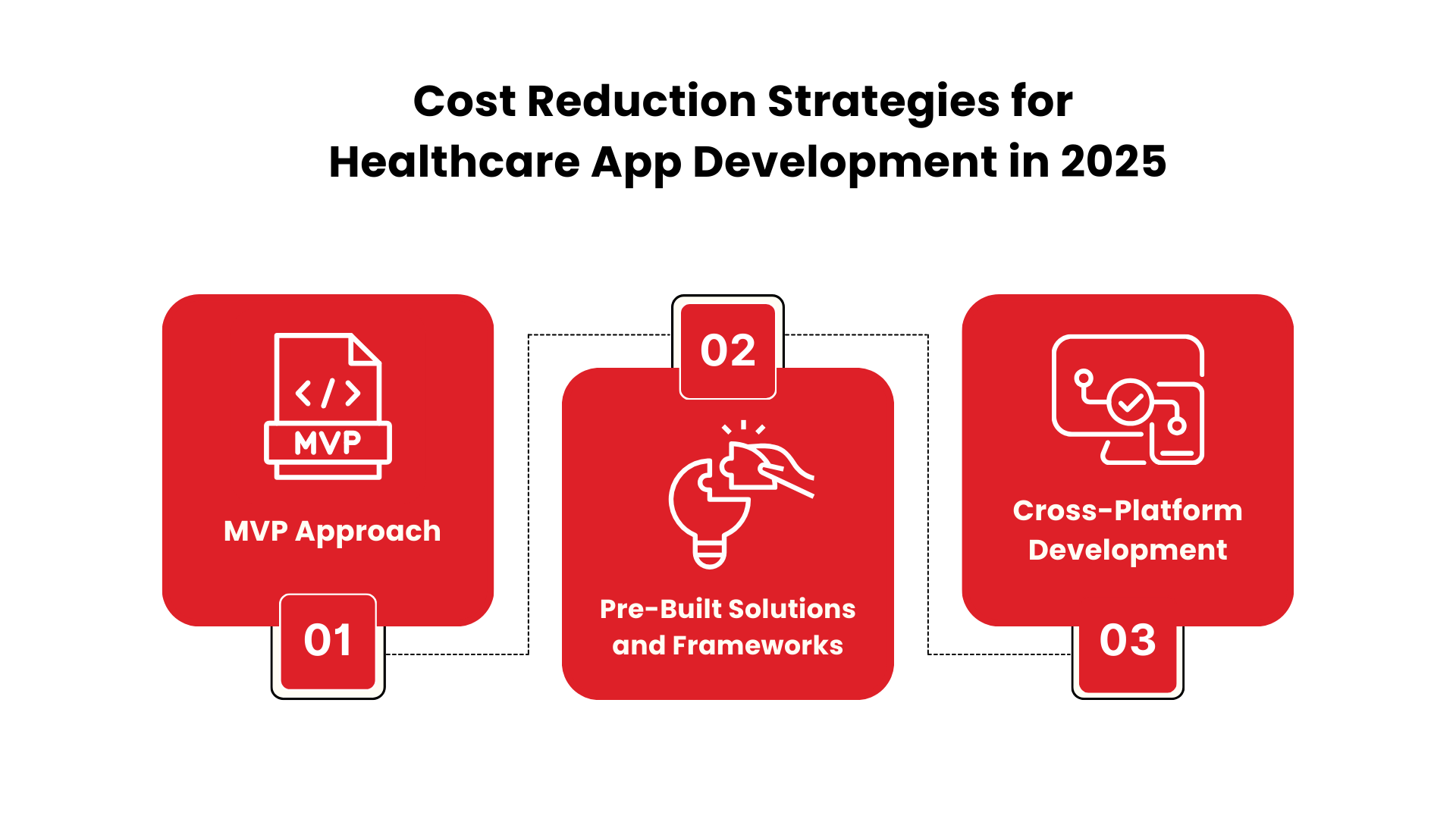
With costs likely to rise, there are ways to minimize expenses on mobile medical app development and achieve your healthcare mobile app development goals. Here are effective strategies for cost reduction:
MVP (Minimum Viable Product) Approach
One of the most impactful ways to cut down on healthcare app development costs is by starting with core functionalities only. MVP app development helps you add essential features, like basic health tracking or telemedicine. This not only keeps initial costs low but also helps gauge user demand and preferences early on in the medical mobile application development process.
Pre-Built Solutions and Frameworks
Incorporating pre-built tools and APIs is a smart move to reduce both development time and costs. Many cloud-based tools offer features like authentication, encryption, and secure data storage, which are fundamental for medical mobile app development. Third-party APIs for essential functions, such as payments or messaging, streamline development, further reducing the healthcare app development cost.
Cross-Platform Development
Opting for cross-platform frameworks like Flutter or React Native allows you to create an app that functions on both iOS and Android with a single codebase. This approach not only expands your user base but also minimizes the mobile healthcare application development cost by eliminating the need for separate development efforts for each platform.
The Future of Healthcare Apps – What’s Coming in 2025 and Beyond?
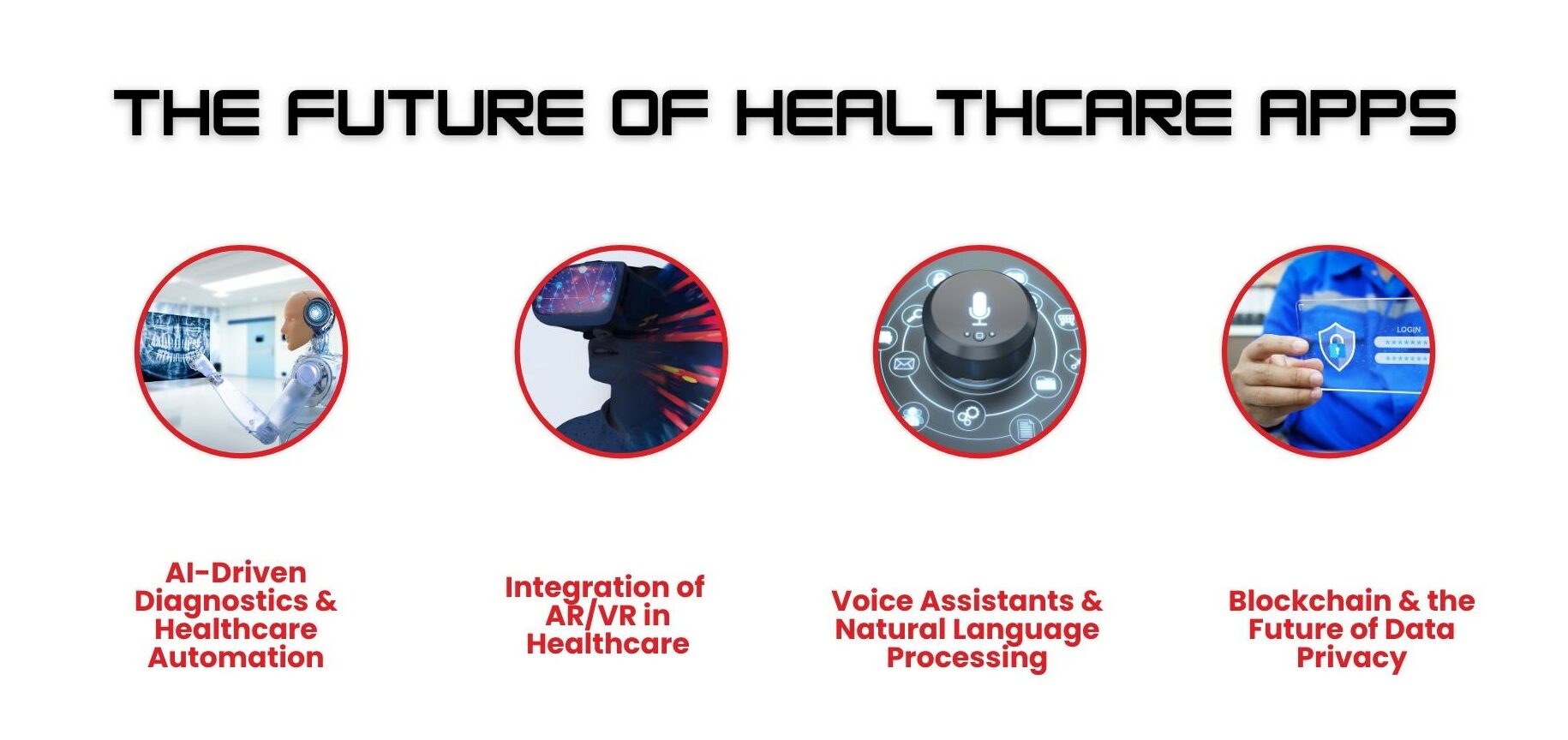
As we progress into 2025, healthcare app development costs will likely be influenced by emerging trends and technologies designed to enhance efficiency and user experience. Here are some trends that are expected to shape the future of medical mobile app development and potentially impact costs.
1. AI-Driven Diagnostics and Healthcare Automation
The integration of AI will continue to improve healthcare apps, offering AI-driven diagnostics and automating routine tasks. As AI technology advances, the cost of implementing it will decrease, making it an affordable solution in mobile health application development.
2. The Integration of AR/VR in Healthcare
Augmented reality (AR) and virtual reality (VR) technologies will enhance hospital mobile app development by adding functionalities for training, patient care, and therapy. Though initially costly, AR and VR are expected to become more affordable as they gain traction in the healthcare sector.
3. Voice Assistants and NLP (Natural Language Processing)
Voice technology, such as natural language processing, will continue to shape healthcare mobile app development. As voice assistants become more advanced and widely adopted, the cost of implementing them is expected to decrease, offering more options for app functionality.
4. Blockchain and the Future of Data Privacy
Blockchain is revolutionizing healthcare data security, allowing secure storage and access to patient records. As more healthcare providers adopt blockchain for patient data management, the healthcare app development cost for blockchain-integrated apps is expected to become more affordable.
Healthcare App Development Trends in Dallas
Dallas is one of the largest and fastest-growing cities in Texas. As a result, there is a strong demand for new healthcare technology in the area. People expect healthcare services to be accessible, efficient, and of high quality. This makes Dallas a great place for creating healthcare apps. Many hospitals and healthcare providers in Dallas are starting to use mobile apps. These apps help improve patient engagement, simplify medical processes, and enhance the quality of care overall.
Popular Healthcare App Types in Dallas
In Dallas, people commonly use healthcare apps like telemedicine platforms, electronic health record (EHR) systems, fitness and wellness trackers, and patient portals. These tools help users access medical information, manage appointments, and communicate with healthcare providers. Since Dallas has a fast-paced lifestyle, these apps need to be convenient, efficient, and secure. There is a strong focus on telemedicine and patient monitoring, making healthcare mobile app development services essential for supporting the healthcare system in Dallas.

Your Healthcare App Development Partner in Dallas
As the demand for mobile healthcare application development continues to rise, Dallas remains at the forefront of the healthcare tech revolution in 2025. Whether you’re looking to build a healthcare app, develop a mobile health application, or integrate AI and IoT into your solutions, TechnBrains is your trusted partner. With local expertise, advanced technologies, and a commitment to security and compliance, TechnBrains is the best choice to bring your healthcare app vision to life in Dallas.
Ready to make an impact in healthcare? Partner with TechnBrains and take your healthcare app to the next level in 2025.


